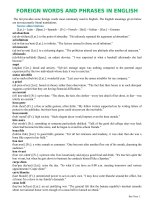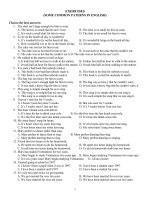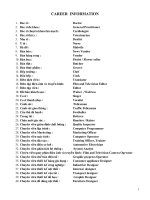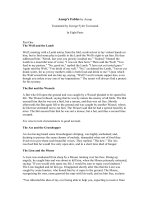short stories in English 2
Bạn đang xem bản rút gọn của tài liệu. Xem và tải ngay bản đầy đủ của tài liệu tại đây (88.69 KB, 9 trang )
Aesop’s Fables
Part Two
The Horse and Groom
A Groom used to spend whole days in currycombing and rubbing down his Horse, but
at the same time stole his oats and sold them for his own profit. "Alas!" said the Horse,
"if you really wish me to be in good condition, you should groom me less, and feed me
more."
The Ass and the Lapdog
A Man had an Ass, and a Maltese Lapdog, a very great beauty. The Ass was left in a
stable and had plenty of oats and hay to eat, just as any other Ass would. The Lapdog
knew many tricks and was a great favorite with his master, who often fondled him and
seldom went out to dine without bringing him home some tidbit to eat. The Ass, on the
contrary, had much work to do in grinding the corn-mill and in carrying wood from the
forest or burdens from the farm. He often lamented his own hard fate and contrasted it
with the luxury and idleness of the Lapdog, till at last one day he broke his cords and
halter, and galloped into his master's house, kicking up his heels without measure, and
frisking and fawning as well as he could. He next tried to jump about his master as he
had seen the Lapdog do, but he broke the table and smashed all the dishes upon it to
atoms. He then attempted to lick his master, and jumped upon his back. The servants,
hearing the strange hubbub and perceiving the danger of their master, quickly relieved
him, and drove out the Ass to his stable with kicks and clubs and cuffs. The Ass, as he
returned to his stall beaten nearly to death, thus lamented: "I have brought it all on
myself! Why could I not have been contented to labor with my companions, and not
wish to be idle all the day like that useless little Lapdog!"
The Lioness
A controversy prevailed among the beasts of the field as to which of the animals
deserved the most credit for producing the greatest number of whelps at a birth. They
rushed clamorously into the presence of the Lioness and demanded of her the settlement
of the dispute. "And you," they said, "how many sons have you at a birth?' The Lioness
laughed at them, and said: "Why! I have only one; but that one is altogether a
thoroughbred Lion."
The value is in the worth, not in the number.
The Boasting Traveler
A Man who had traveled in foreign lands boasted very much, on returning to his own
country, of the many wonderful and heroic feats he had performed in the different
places he had visited. Among other things, he said that when he was at Rhodes he had
leaped to such a distance that no man of his day could leap anywhere near him as to
that, there were in Rhodes many persons who saw him do it and whom he could call as
witnesses. One of the bystanders interrupted him, saying: "Now, my good man, if this
be all true there is no need of witnesses. Suppose this to be Rhodes, and leap for us."
The Cat and the Cock
A Cat caught a Cock, and pondered how he might find a reasonable excuse for eating
him. He accused him of being a nuisance to men by crowing in the nighttime and not
permitting them to sleep. The Cock defended himself by saying that he did this for the
benefit of men, that they might rise in time for their labors. The Cat replied, "Although
you abound in specious apologies, I shall not remain supperless"; and he made a meal
of him.
The Piglet, the Sheep, and the Goat
A young Pig was shut up in a fold-yard with a Goat and a Sheep. On one occasion when
the shepherd laid hold of him, he grunted and squeaked and resisted violently. The
Sheep and the Goat complained of his distressing cries, saying, "He often handles us,
and we do not cry out." To this the Pig replied, "Your handling and mine are very
different things. He catches you only for your wool, or your milk, but he lays hold on
me for my very life."
The Boy and the Filberts
A Boy put his hand into a pitcher full of filberts. He grasped as many as he could
possibly hold, but when he tried to pull out his hand, he was prevented from doing so
by the neck of the pitcher. Unwilling to lose his filberts, and yet unable to withdraw his
hand, he burst into tears and bitterly lamented his disappointment. A bystander said to
him, "Be satisfied with half the quantity, and you will readily draw out your hand."
Do not attempt too much at once.
The Lion in Love
A Lion demanded the daughter of a woodcutter in marriage. The Father, unwilling to
grant, and yet afraid to refuse his request, hit upon this expedient to rid himself of his
importunities. He expressed his willingness to accept the Lion as the suitor of his
daughter on one condition: that he should allow him to extract his teeth, and cut off his
claws, as his daughter was fearfully afraid of both. The Lion cheerfully assented to the
proposal. But when the toothless, clawless Lion returned to repeat his request, the
Woodman, no longer afraid, set upon him with his club, and drove him away into the
forest.
The Laborer and the Snake
A Snake, having made his hole close to the porch of a cottage, inflicted a mortal bite on
the Cottager's infant son. Grieving over his loss, the Father resolved to kill the Snake.
The next day, when it came out of its hole for food, he took up his axe, but by swinging
too hastily, missed its head and cut off only the end of its tail. After some time the
Cottager, afraid that the Snake would bite him also, endeavored to make peace, and
placed some bread and salt in the hole. The Snake, slightly hissing, said: "There can
henceforth be no peace between us; for whenever I see you I shall remember the loss of
my tail, and whenever you see me you will be thinking of the death of your son."
No one truly forgets injuries in the presence of him who caused the injury.
The Wolf in Sheep's Clothing
Once upon a time a Wolf resolved to disguise his appearance in order to secure food
more easily. Encased in the skin of a sheep, he pastured with the flock deceiving the
shepherd by his costume. In the evening he was shut up by the shepherd in the fold; the
gate was closed, and the entrance made thoroughly secure. But the shepherd, returning
to the fold during the night to obtain meat for the next day, mistakenly caught up the
Wolf instead of a sheep, and killed him instantly.
Harm seek. Harm find.
The Ass and the Mule
A Muleteer set forth on a journey, driving before him an Ass and a Mule, both well
laden. The Ass, as long as he traveled along the plain, carried his load with ease, but
when he began to ascend the steep path of the mountain, felt his load to be more than he
could bear. He entreated his companion to relieve him of a small portion, that he might
carry home the rest; but the Mule paid no attention to the request. The Ass shortly
afterwards fell down dead under his burden. Not knowing what else to do in so wild a
region, the Muleteer placed upon the Mule the load carried by the Ass in addition to his
own, and at the top of all placed the hide of the Ass, after he had skinned him. The
Mule, groaning beneath his heavy burden, said to himself: "I am treated according to
my deserts. If I had only been willing to assist the Ass a little in his need, I should not
now be bearing, together with his burden, himself as well."
The Frogs Asking for a King
The Frogs, grieved at having no established Ruler, sent ambassadors to Jupiter
entreating for a King. Perceiving their simplicity, he cast down a huge log into the lake.
The Frogs were terrified at the splash occasioned by its fall and hid themselves in the
depths of the pool. But as soon as they realized that the huge log was motionless, they
swam again to the top of the water, dismissed their fears, climbed up, and began
squatting on it in contempt. After some time they began to think themselves ill-treated
in the appointment of so inert a Ruler, and sent a second deputation to Jupiter to pray
that he would set over them another sovereign. He then gave them an Eel to govern
them. When the Frogs discovered his easy good nature, they sent yet a third time to
Jupiter to beg him to choose for them still another King. Jupiter, displeased with all
their complaints, sent a Heron, who preyed upon the Frogs day by day till there were
none left to croak upon the lake.
The Boys and the Frogs
Some boys, playing near a pond, saw a number of Frogs in the water and began to pelt
them with stones. They killed several of them, when one of the Frogs, lifting his head
out of the water, cried out: "Pray stop, my boys: what is sport to you, is death to us."
The Sick Stag
A sick stag lay down in a quiet corner of its pasture-ground. His companions came in
great numbers to inquire after his health, and each one helped himself to a share of the
food which had been placed for his use; so that he died, not from his sickness, but from
the failure of the means of living.
Evil companions bring more hurt than profit.
The Salt Merchant and His Ass
A Peddler drove his Ass to the seashore to buy salt. His road home lay across a stream
into which his Ass, making a false step, fell by accident and rose up again with his load
considerably lighter, as the water melted the sack. The Peddler retraced his steps and
refilled his panniers with a larger quantity of salt than before. When he came again to
the stream, the Ass fell down on purpose in the same spot, and, regaining his feet with
the weight of his load much diminished, brayed triumphantly as if he had obtained what
he desired. The Peddler saw through his trick and drove him for the third time to the
coast, where he bought a cargo of sponges instead of salt. The Ass, again playing the
fool, fell down on purpose when he reached the stream, but the sponges became
swollen with water, greatly increasing his load. And thus his trick recoiled on him, for
he now carried on his back a double burden.
The Oxen and the Butchers
The Oxen once upon a time sought to destroy the Butchers, who practiced a trade
destructive to their race. They assembled on a certain day to carry out their purpose, and
sharpened their horns for the contest. But one of them who was exceedingly old (for
many a field had he plowed) thus spoke: "These Butchers, it is true, slaughter us, but
they do so with skillful hands, and with no unnecessary pain. If we get rid of them, we
shall fall into the hands of unskillful operators, and thus suffer a double death: for you
may be assured, that though all the Butchers should perish, yet will men never want
beef."
Do not be in a hurry to change one evil for another.
The Lion, the Mouse, and the Fox
A Lion, fatigued by the heat of a summer's day, fell fast asleep in his den. A Mouse ran
over his mane and ears and woke him from his slumbers. He rose up and shook himself
in great wrath, and searched every corner of his den to find the Mouse. A Fox seeing
him said: "A fine Lion you are, to be frightened of a Mouse." "'Tis not the Mouse I
fear," said the Lion; "I resent his familiarity and ill-breeding."
Little liberties are great offenses.
The Vain Jackdaw
Jupiter determined, it is said, to create a sovereign over the birds, and made
proclamation that on a certain day they should all present themselves before him, when
he would himself choose the most beautiful among them to be king. The Jackdaw,
knowing his own ugliness, searched through the woods and fields, and collected the
feathers which had fallen from the wings of his companions, and stuck them in all parts
of his body, hoping thereby to make himself the most beautiful of all. When the
appointed day arrived, and the birds had assembled before Jupiter, the Jackdaw also
made his appearance in his many feathered finery. But when Jupiter proposed to make
him king because of the beauty of his plumage, the birds indignantly protested, and
each plucked from him his own feathers, leaving the Jackdaw nothing but a Jackdaw.
The Goatherd and the Wild Goats
A Goatherd, driving his flock from their pasture at eventide, found some Wild Goats
mingled among them, and shut them up together with his own for the night. The next
day it snowed very hard, so that he could not take the herd to their usual feeding places,
but was obliged to keep them in the fold. He gave his own goats just sufficient food to
keep them alive, but fed the strangers more abundantly in the hope of enticing them to
stay with him and of making them his own. When the thaw set in, he led them all out to
feed, and the Wild Goats scampered away as fast as they could to the mountains. The
Goatherd scolded them for their ingratitude in leaving him, when during the storm he
had taken more care of them than of his own herd. One of them, turning about, said to
him: "That is the very reason why we are so cautious; for if you yesterday treated us
better than the Goats you have had so long, it is plain also that if others came after us,
you would in the same manner prefer them to ourselves."
Old friends cannot with impunity be sacrificed for new ones.
The Mischievous Dog
A Dog used to run up quietly to the heels of everyone he met, and to bite them without
notice. His master suspended a bell about his neck so that the Dog might give notice of
his presence wherever he went. Thinking it a mark of distinction, the Dog grew proud
of his bell and went tinkling it all over the marketplace. One day an old hound said to
him: Why do you make such an exhibition of yourself? That bell that you carry is not,
believe me, any order of merit, but on the contrary a mark of disgrace, a public notice to
all men to avoid you as an ill mannered dog."
Notoriety is often mistaken for fame.
The Fox Who Had Lost His Tail
A Fox caught in a trap escaped, but in so doing lost his tail. Thereafter, feeling his life a
burden from the shame and ridicule to which he was exposed, he schemed to convince
all the other Foxes that being tailless was much more attractive, thus making up for his
own deprivation. He assembled a good many Foxes and publicly advised them to cut
off their tails, saying that they would not only look much better without them, but that
they would get rid of the weight of the brush, which was a very great inconvenience.
One of them interrupting him said, "If you had not yourself lost your tail, my friend,
you would not thus counsel us."
The Boy and the Nettles
A Boy was stung by a Nettle. He ran home and told his Mother, saying, "Although it









